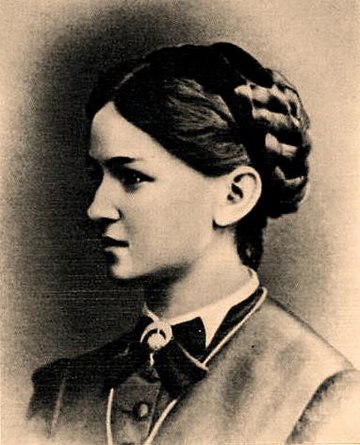1848 - 1919
By: Alla Akerzhnerman | Date Added:

Nadezhda Rimskaya-Korsakova was a Russian pianist and composer as well as the wife of composer Nikolai Rimsky-Korsakov. She was also the mother of Russian musicologist Andrey Rimsky-Korsakov. Born Nadezhda Purgold in St. Petersburg, she was the youngest of 18th-century jurist Johann Purgold. She started playing the piano at age nine, continuing her piano studies at the St. Petersburg Conservatory She also studied music theory at the conservatory and, later, composition and orchestration with Rimsky-Korsakov but did not graduate. During the 1860s and '70s, she played piano at musical soirees at the home of Alexander Dargomyzhsky. She met Rimsky-Korsakov in 1868. Not long after their first meeting, he wrote a song which he dedicated to her. She found in him an abundance of warmth and gentleness. He proposed to her in December 1871, and they married in July 1872. Mussorgsky was Rimsky-Korsakov's best man. The Rimsky-Korsakov would eventually have seven children. Nadezhda was to become a musical as well as a domestic partner with her husband. She proved a good and most demanding critic of his work; her influence over him in musical matters was strong. She was leading him astray from their musical preferences. She attended rehearsals and proofread and arranged compositions. Nadezhda was also very prominent in the Rimsky-Korsakov' social life, active in gatherings at the Rimsky-Korsakov household as both accompanist and performer. After hearing it, she begged the composer in tears to let her arrange it for piano duet. Like her husband in his later years, Nadezhda's musical tastes became less progressive. This was not the only time she was not afraid to speak her mind. In matters regarding her husband, she was fiercely loyal. Upon Rimsky-Korsakov's death in 1908, Nadezhda became the executrix of his literary and musical estates. This included the considerable job of editing and publishing his posthumous literary and musical works. These included his autobiography, My Musical Life, collections of articles and notes on music plus a part of his correspondence with friends. She spent the rest of her life preserving his legacy, among other things, protesting Sergei Diaghilev's use of music from Scheherazade and The Golden Cockerel for ballets. She died of smallpox in St. Petersburg at age 70. After her death, her son Andrei continued her efforts, writing a multi-volume study of his father's life and work. Dargomyzhsky taught Rimskaya-Korsakova how to reduce orchestral scores a task for which she was especially talented and adept and which she would put to good use. Her transcriptions (for piano four-hands) include works by Dargomyzhsky, Rimsky-Korsakov, Tchaikovsky, Borodin and Glazunov. She also arranged the vocal scores for Rimsky-Korsakov's The Maid of Pskov and The Noblewoman Vera Sheloga,[along with Borodin's Prince Igor in conjunction with Glazunov and her husband. She published two recollections of Dargomyzhsky, wrote a memoir of Mussorgsky, and edited her husband's autobiography, My Musical Life.
click hereShare your thoughts on this story with us. Your comments will not be made public.
Email
Copyright ©2016 - Design By Bureau Blank